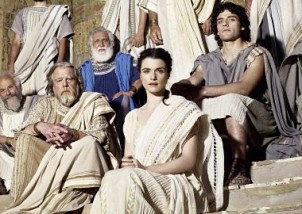
If you don’t know the name Hypatia, you should. In the grand mythology of the Enlightenment (to which, on optimistic days, I subscribe), her murder at the hands of a Christian mob marks more or less the end of Greek philosophy and the beginning of the Dark Ages. Now, for those of you who don’t know her, there’s a blockbuster historical epic movie about Hypatia (though it has scored only limited distribution in the U.S.). And, for those of you who don’t trust blockbuster historical epic movies, I’ve got a review of it on Religion Dispatches today:
Hearing about Agora’s success in Spain last year—the highest-grossing film of the year, sweeping up awards—couldn’t help but bring to my mind the empty insides of so many of that country’s churches, still charred after the various anti-clerical mobs of the last few centuries. I wasn’t the only one to make that association. With predictable ressentiment, an open letter came to Amenábar from the Religious Anti-Defamation Observatory, a Catholic watchdog in Spain, warning him: “Your film is going to awaken hatred against Christians in today’s society.”
American “Catholic evangelist” Fr. Robert Barron adds in his Catholic New World review, “I wonder if it ever occurred to Amenábar that his movie might incite violence against religious people, especially Christians.” One can only hope that it’s not a good enough movie to drive people to the streets.
In an interview with the New York Times, though, Amenábar turned the tables on his pious critics. “Fundamentally, this is a very Christian film about the life of a martyr,” he explained. “Jesus would not have approved of what happened to Hypatia, which is why I say no good Christian should feel offended by this film.” In this respect, at least, his sentiments have historical basis.
Keep reading to find out why.
Comments
One response to “Martyr City”
Amenabar (cool name, sounds like a Christian confectionary) makes a valid point I think, that has been made by countless others. Last night I was reading in Thomas Melville’s biography “Who’s Heaven, Who’s Earth?” the conflict that erupted inside of him as a Catholic Priest when he saw that the Church in Central America was responsible or indifferent to the terrible poverty and suffering around him, while many of the “pagans” he met who had never heard of Christianity were practicing the authentic spirit of the religion.
It’s kind of unusual for a woman to be remembered as a philosopher isn’t it? That has some implications as well.
After so many years of the Powers that be, having a heyday with epics like “The Ten Commandments” or “The Robe”, let the secular humanists have a go at it and let’s not whine, my Christian brothers.